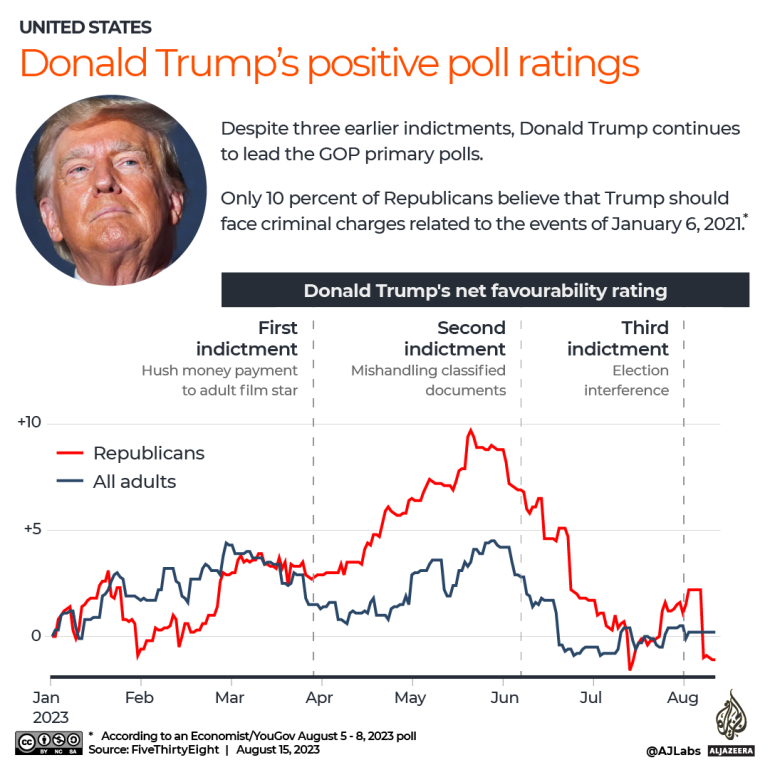Georgia indictment to ‘solidify’ Trump’s support for now, analysts say By Joseph Stepansky
Washington, DC – Donald Trump’s fourth criminal indictment has raised new questions around the political landscape in the United States, but analysts say it is unlikely to have an immediate effect on the former president’s push for the Republican Party’s 2024 nomination.

Former US President Donald Trump, who has denied any wrongdoing in all the cases against him, remains the frontrunner in the Republican 2024 presidential nomination race [File: Charlie Neibergall/AP Photo]
The indictment in Georgia – which ensnares Trump and 18 associates in connection with efforts to meddle with the 2020 vote results in the state – fits into the ex-president’s oft-repeated claims that he is being systematically targeted by partisan political elites.
That has been a view largely embraced by his supporters, making it unlikely that the Georgia charges – much like those that preceded them – will hurt Trump’s support in the polls, said Geoffrey Kabaservice, vice president of the Niskanen Center think tank.
“The reality is that these indictments only solidify his hold over the Republican base,” Kabaservice told Al Jazeera.
“Well before his presidency was up, his followers decided that he was their champion,” he said. “Trump, even before he ran, said that he could go down to Fifth Avenue [in New York City] and shoot somebody and people would still support him, and I think that has proven out.”
Trump – who has denied any wrongdoing in all the cases against him – is the clear frontrunner in the Republican nomination race, leading his closest challenger, Florida Governor Ron DeSantis, by 38 percentage points, according to an average of recent US polling data maintained by the FiveThirtyEight website.
The poll aggregator found that Trump’s support among Republicans rose sharply in the wake of his first indictment in New York earlier this year on charges related to a hush-money payment made to an adult film star.
Republican support trended downward somewhat following his second indictment in June in a federal case related to his handling of classified documents, and it levelled off in the wake of his third indictment on federal charges related to efforts to subvert the 2020 election, the website said.
But despite the indictments failing to dampen Trump’s early lead, several political observers told Al Jazeera that the unprecedented criminal cases against the former president could represent a liability for him in the general election in November 2024.
That contest will see Trump most likely face off against Democratic President Joe Biden in a rematch of the 2020 vote that Biden won. Just how much of a liability remains to be seen, with several recent polls showing a tight race between the pair.
At the same time, the latest case against Trump is likely to continue to siphon time and resources from him ahead of the busy US election season, said Henry Olsen, a senior fellow at the Ethics and Public Policy Center, a think tank and advocacy group in Washington, DC.
“As long as he’s paying for his legal fees from his campaign expenses, it means that he has yet another drain on those campaign expenses,” Olsen told Al Jazeera. “[That] makes it difficult for him to mount the sort of campaign you need in order to win a nomination or win a general election.”

String of indictments
Trump is the first current or former president in US history to be indicted, let alone face criminal charges in four separate cases in both state and federal court.
However, the US Constitution does not prevent a person who is indicted or even convicted of a crime from running for or winning the presidency.
The latest charges in Georgia, laid out in a sweeping, 41-count indictment released on Monday, implicate Trump and 18 lawyers and other aides – including former Chief of Staff Mark Meadows and personal lawyer Rudy Giuliani – in a plot to overturn the 2020 election results in the state.
Prosecutors said the group’s efforts included lying to state officials and legislators, harassing election workers, breaching voting machines, and then seeking to cover up their illicit actions, according to the indictment.
Fulton County District Attorney Fani Willis, who is leading the case, has charged Trump and his associates under a state racketeering law – known as a RICO law – that allows prosecutors to charge multiple people who commit separate crimes while working towards a common goal.
Such laws are typically used to prosecute organised crime and corruption.
Despite the sense of a deja vu at another Trump indictment this week, legal observers said the Georgia case stands apart from the other criminal proceedings against the former president for several reasons, many of which could have implications for his political future.
